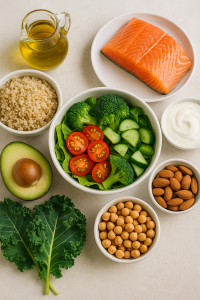Hormonal Belly Fat in Women: What It Really Means

Many women struggle with belly fat that just won’t budge — no matter how healthy they eat or how much they exercise. The truth is, it’s not always about calories. Often, hormonal imbalance is the hidden culprit behind that stubborn midsection weight.
In this guide, we’ll explore what hormonal belly fat in women really means, why it happens, and how you can finally manage it through science-backed, holistic strategies.
Understanding Hormonal Belly Fat
Hormonal belly fat refers to abdominal fat accumulation caused by imbalances in key hormones such as estrogen, cortisol, insulin, and progesterone. These hormones influence how your body stores fat, manages stress, and regulates metabolism.
Unlike regular fat gain from overeating, hormonal belly fat can develop even when you’re maintaining a healthy diet and lifestyle — making it uniquely challenging for women.
The Science Behind Hormonal Weight Gain
Hormones are chemical messengers that control nearly every process in the body — including hunger, energy, and fat storage. When they fall out of balance, your body can start storing fat around your abdomen, even without extra calorie intake.
For instance:
-
Low estrogen shifts fat storage from hips to the belly.
-
High cortisol triggers fat storage during stress.
-
Insulin resistance prevents fat burning.
Understanding these hormonal players helps you tackle the root cause — not just the symptom.
Key Hormones That Influence Belly Fat in Women
Estrogen: The Feminine Fat Regulator
Estrogen levels fluctuate throughout a woman’s life — especially during perimenopause and menopause. Low estrogen levels encourage fat to relocate from the hips and thighs to the abdomen, leading to the classic “menopause belly.”
Maintaining estrogen balance through plant-based phytoestrogens (like flaxseeds and soy) and strength training can help reduce this effect.
Cortisol: The Stress-Induced Fat Hormone
Chronic stress triggers the release of cortisol, your body’s fight-or-flight hormone. High cortisol increases appetite and cravings for high-sugar, high-fat foods while promoting visceral fat — the dangerous kind that surrounds your organs.
Mindfulness, yoga, deep breathing, and adequate sleep can naturally lower cortisol levels.
Insulin: The Blood Sugar and Fat Storage Connection
Insulin helps move glucose into your cells for energy. However, frequent spikes from refined carbs and sugary foods lead to insulin resistance, which traps fat — especially around your belly.
Balancing insulin involves lowering sugar intake, eating fiber-rich meals, and engaging in regular physical activity.
Leptin and Ghrelin: Hunger and Satiety Hormones
Leptin tells your brain when you’re full, while ghrelin signals hunger. Poor sleep, stress, and overeating disrupt these hormones, leading to constant hunger and belly fat accumulation.
Improving sleep and eating high-protein breakfasts help regulate both.
Signs You Have Hormonal Belly Fat
Physical Symptoms
-
A rounder, firmer belly that persists even with diet and exercise.
-
Bloating or puffiness around the midsection.
-
Weight gain mainly around the waist despite stable weight elsewhere.
Emotional and Behavioral Clues
-
Mood swings and irritability.
-
Fatigue and disrupted sleep.
-
Sugar cravings or increased appetite.
If these symptoms sound familiar, it’s worth discussing hormone testing with a healthcare professional.
Common Triggers of Hormonal Belly Fat
Menopause and Hormonal Transition
During menopause, estrogen drops dramatically, slowing metabolism and altering where fat is stored. This transition is one of the leading causes of hormonal belly fat in women over 40.
Stress and Cortisol Overload
Long-term stress doesn’t just affect your mind — it physically changes your waistline. Chronic cortisol elevation signals your body to conserve fat around the belly.
Poor Sleep and Hormone Imbalance
Sleep is when your body resets hormonal balance. Lack of quality rest increases ghrelin (hunger) and lowers leptin (fullness), driving overeating.
Birth Control and Hormonal Medications
Certain oral contraceptives or hormone therapies can alter your body’s natural estrogen and progesterone balance, sometimes leading to increased abdominal fat.
How to Lose Hormonal Belly Fat Naturally
Nutrition Strategies That Work

-
Eat balanced meals with lean protein, healthy fats, and complex carbs.
-
Avoid refined sugars and alcohol to stabilize insulin levels.
-
Increase fiber intake — especially soluble fiber from oats, flaxseed, and beans.
-
Include omega-3 fats (salmon, chia seeds) to reduce inflammation.
The Role of Exercise and Movement
-
Strength training increases muscle and boosts metabolism.
-
HIIT workouts improve insulin sensitivity and burn fat faster.
-
Walking and yoga lower cortisol levels naturally.
Stress Management and Mindfulness
Try deep breathing, journaling, or meditation for 10 minutes daily. Consistency is key to rebalancing your hormonal rhythm.
Medical Approaches and When to Seek Help
Functional Medicine Testing
Ask your doctor about testing levels of:
-
Estrogen and progesterone
-
Cortisol (via saliva or urine tests)
-
Insulin and glucose levels
-
Thyroid hormones
Medical Treatments and Lifestyle Integration
If your hormones are significantly off balance, treatments may include bioidentical hormone therapy, dietary adjustments, or stress-focused therapies under medical supervision.
Myths About Hormonal Belly Fat
| Myth | Truth |
|---|---|
| It’s just from overeating | Hormones can cause fat storage even with a clean diet. |
| Menopause belly is inevitable | Lifestyle changes can reverse fat gain. |
| Crunches will burn belly fat | Fat loss happens through full-body metabolism, not spot reduction. |
FAQs on Hormonal Belly Fat in Women
1. Can hormonal belly fat go away naturally?
Yes, with hormone-balancing nutrition, stress control, and regular movement, many women successfully reduce it naturally.
2. Does estrogen replacement help?
For some postmenopausal women, supervised hormone therapy may assist, but it must be done under medical advice.
3. How long does it take to lose hormonal belly fat?
Most women notice improvement within 8–12 weeks of consistent lifestyle changes.
4. Can stress alone cause belly fat?
Yes, chronic cortisol elevation directly promotes visceral fat storage.
5. What’s the best diet for hormonal belly fat?
A low-sugar, high-protein, whole-food diet supports insulin balance and fat metabolism.
6. Should I see a doctor for hormonal belly fat?
Yes, especially if weight gain is sudden or accompanied by fatigue, mood changes, or menstrual irregularities.
Conclusion: Balancing Hormones, Regaining Confidence
Hormonal belly fat in women isn’t just a cosmetic issue — it’s a message from your body that your hormones need attention. By focusing on balanced nutrition, regular movement, and stress management, you can restore harmony within your body and reclaim your health.
Remember: The key isn’t restriction — it’s balance.
👉 Explore science-backed hormone resources from Harvard Health to continue your journey.


